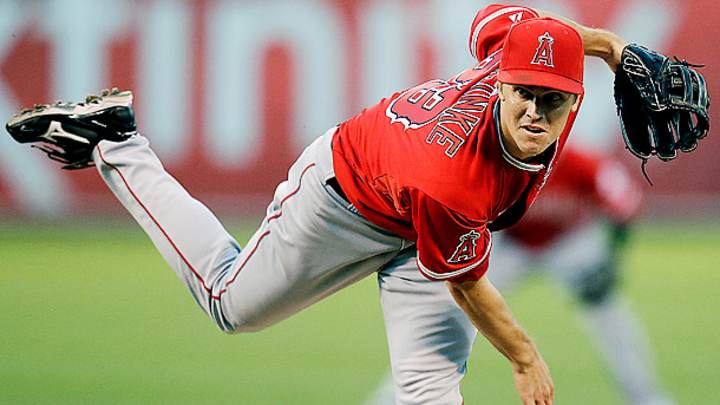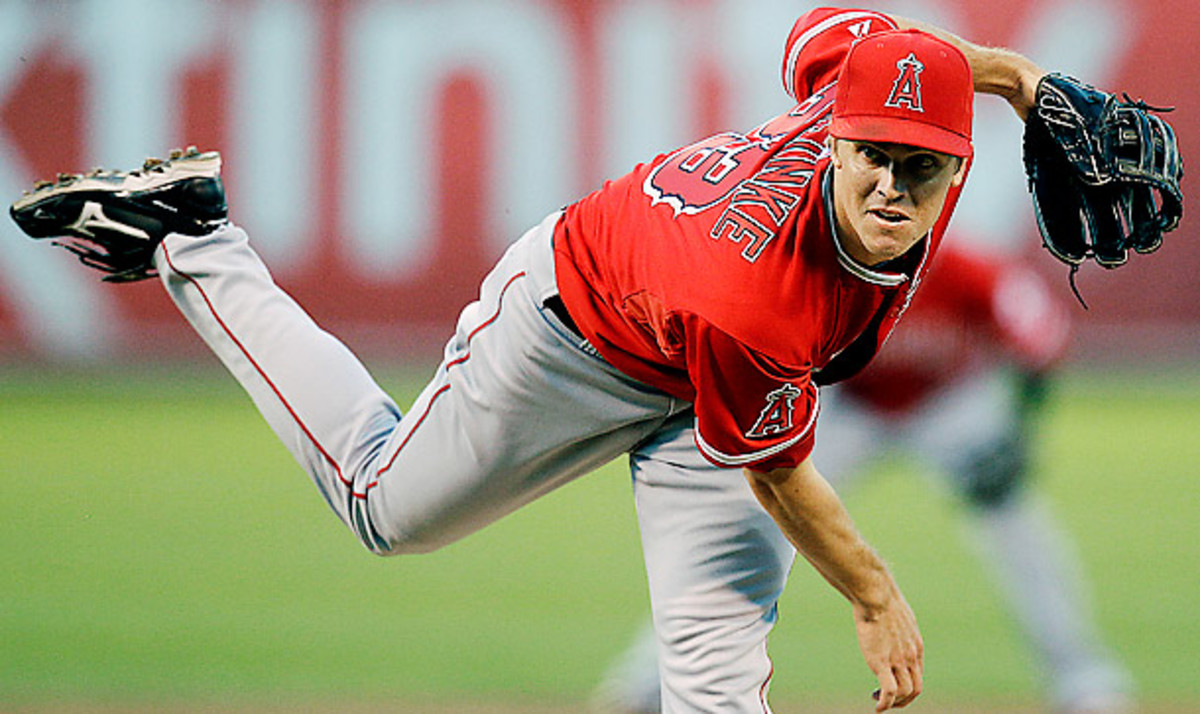Free-agent Greinke should benefit from Yankees' signing of Kuroda

Zack Greinke will be the most sought-after pitcher on the free-agent market. (Ben Margot/AP)

Earlier this week, one of the first major free-agent dominoes fell, as Hiroki Kuroda agreed to a one-year, $15 million deal (plus incentives) to return to the Yankees. The 37-year-old righty's new contract didn't set the market, but his signing did up the ante for any team in search of frontline starting pitching, particularly the Angels and the Dodgers. Both teams sought Kuroda as a relatively inexpensive short-term alternative to Zack Greinke, the winter's top free agent starter. Now the 29-year-old Greinke has a pair of deep-pocketed contenders just that much more desperate to strike a deal.
Greinke is coming off a strong but not exceptional season in which he delivered a 3.48 ERA and struck out 8.5 batters per nine in 212 1/3 innings split between the Brewers and the Angels. Sprung from the Royals via a six-player blockbuster in December 2010, Greinke had helped the Brewers to a division title in 2011, but the Brewers' sluggish start and the likelihood that they couldn't re-sign him once he reached free agency made him a top trading deadline commodity. The Angels sent three prospects — shortstop Jean Segura and righties Johnny Hellweg and Ariel Pena — to Milwaukee on July 27, fortifying themselves for a stretch run in which they ultimately fell short of the payoff, a playoff bid.
Superficially, Greinke's performance with the Angels was about the same as with the Brewers; he was 9-3 with a 3.44 ERA prior to the deal, then 6-2 with a 3.53 mark afterwards. But a peek under the hood shows that his performance took a significant hit once he was dealt:
Team | GS | QS% | IP | HR/9 | BB/9 | SO/9 | BABIP | FIP | ERA |
|---|---|---|---|---|---|---|---|---|---|
Brewers | 21 | 62 | 123.0 | 0.5 | 2.0 | 8.9 | .328 | 2.58 | 3.44 |
Angels | 13 | 54 | 89.1 | 1.1 | 2.6 | 7.9 | .284 | 3.84 | 3.53 |
Beyond the expected drop in strikeout rate that comes with moving from the NL to the AL due to pitchers hitting, Greinke's walk rate climbed, and his home run rate more than doubled. His Fielding Independent Pitching, an estimate of his ERA based upon those rate stats, was 49 percent higher with the Halos, but that was camouflaged by a sharp improvement in the quality of his defensive support via a 54-point drop in batting average on balls in play.
There's a fair bit of luck and/or randomness in Greinke's BABIP decline, and the same is true when it comes to the longballs; his rate of home runs per flyball spiked from 8.2 percent with Milwaukee to 12.1 percent with Anaheim. In that respect, it was almost a typical Greinke year, as his HR/FB rate has bounced around considerably since he emerged as a frontline starter. In 2008, his first 200-inning season, it was 9.1 percent, the same as his current career mark. His 2009 Cy Young-winning performance was helped along by a league-best 2.16 ERA that owed plenty to a drop in that rate to 4.5 percent, while the bounceback to 7.5 percent the following season caused his ERA nearly to doubled. His rate spiked to 13.6 percent in 2011 before regressing last year.
Such fluctuations make figuring how much Greinke is worth particularly difficult, because various value metrics assume pitchers have differing levels of control over such matters. Consider the way FanGraphs' version of Wins Above Replacement (fWAR) contrasts with that of Baseball-Reference.com (rWAR), as well as Baseball Prospectus' Wins Above Replacement Player (WARP):
Year | ERA | FIP | fWAR | bWAR | WARP |
|---|---|---|---|---|---|
2008 | 3.47 | 3.59 | 4.9 | 5.0 | 3.6 |
2009 | 2.16 | 2.38 | 9.3 | 10.1 | 7.2 |
2010 | 4.17 | 3.31 | 5.1 | 3.2 | 2.9 |
2011 | 3.83 | 2.95 | 4.0 | 1.4 | 3.3 |
2012 | 3.48 | 3.11 | 5.1 | 3.3 | 3.1 |
Total | 3.39 | 3.06 | 28.4 | 23.0 | 20.1 |
FanGraphs' version of WAR centers around FIP, which assumes the least control over BABIP and HR/FB, values Greinke the most highly, and sees his performance as fairly consistent across the years save for 2009. Baseball-Reference's version of WAR centers around runs allowed (including unearned runs) and thus takes Greinke's ERAs much more literally; it was quite down on his 2011 season. WARP, which accounts for situational factors (inherited baserunners and the ability to get groundballs in double play situations, for example), sees his performance as even more consistent than fWAR. Because of differing replacement levels as well, all come up with different win values, and all translate at different exchange rates in terms of free agent dollars, with one fWAR worth about $4.5 million, one bWAR around $5 million, and one WARP around $6 million. Using a straight three-year average and not adjusting for inflation — an oversimplification, admittedly — one can throw dollar figures on those performances ranging from $13 million to $21 million a year.
Greinke will top that higher figure as an annual average on the open market; earlier this month, he was said to be seeking a six-year, $150 million deal. A $25 million annual average would exceed CC Sabathia's top-of-the-line $24.4 million annual average, as well as the $24 million averages of Cliff Lee and Cole Hamels, the $22.9 million of Johan Santana, and the $21.25 million of Matt Cain. Keep in mind that the ink is barely dry on the Cain and Hamels deals; the latter's extension just before the trade deadline took him off the market and increased the stakes for those still seeking frontline help. Greinke, like Sabathia and Lee, has a Cy Young to his credit, but he and Santana are the only pitchers among that group who haven't reached at least one World Series; Lee, Hamels and Cain have all reached two. Such factors aren't the only ones that help determine the pecking order among high-end contracts, but they do play a part.
Greinke isn't guaranteed to get a $150 million deal, but with the Angels and Dodgers both interested, his odds are better. The Angels committed nearly $320 million last winter to free agents Albert Pujols and C.J. Wilson, and cleaned out their farm system to acquire Greinke; adding insult to injury by losing him would be a bit of a blow in terms of public relations. In trying to free up salary space to retain Greinke, they shed both Ervin Santana and Dan Haren; remarkably, they offloaded $12 million of the former's $13 million 2013 salary on the Royals, but they also paid a pricey $3.5 million buyout on the latter's $15.5 million option due to concerns about his back. To keep up with the Rangers and A's, both of whom made the playoffs, they need Greinke to join Wilson and Jered Weaver at the front of their rotation, and given their lack of prospects, the alternative of trading for another starter would be much more complicated. They have some $97 million committed to just eight players for 2013, $100 million committed to that same core for 2014, and they're likely to top this past season's $151.4 million payroll in filling out that roster.
Meanwhile, the Dodgers have been on an absurd spending spree since their new owners bought the team for a record $2.15 billion this spring; after their June extension to Andre Ethier, their deadline acquisition of Hanley Ramirez, their August blockbuster with the Red Sox and their recent extension for reliever Brandon League, they have $198.3 million committed to 18 players and a few ex-players for 2013, $142.2 million committed for 2014, and $98.5 million committed for 2015. Their rotation is already overcrowded with Clayton Kershaw, Josh Beckett, Chad Billingsley, Ted Lilly, Chris Capuano and Aaron Harang under contract for 2013, but there's no clear number two starter behind Kershaw. Beckett has been plagued by an even-year/odd-year inconsistency during his career, suggesting 2013 will be an upgrade from his 4.65 ERA, while Lilly is coming off season-ending shoulder surgery and Billingsley a season-ending elbow injury that may yet require Tommy John surgery. The Dodgers won the rights to 25-year-old Korean lefty Ryu Hyun-Jin with a $25.7 million posting fee, but they're not assured of signing him, and while he'd come much cheaper than Greinke, he'll still be costly. Greinke would represent more of a known commodity, and the Dodgers may view signing him away from the Angels as a PR coup in an ongoing battle that's seen the Angels — the Los Angeles Angels of Anaheim, mind you — get the upper hand more often than not in recent years.
Kyle Lohse
Ryan Dempster
